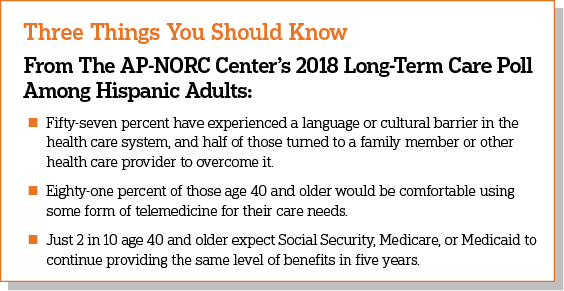
© 2018 iStock/Kondoros Eva Katalin
More than half of Hispanic adults have encountered a communication barrier in the health care system, and they turn to a variety of formal and informal sources for help in overcoming these obstacles, according to a new study conducted by The Associated Press-NORC Center for Public Affairs Research. The study finds that half of these Hispanic adults age 18 and older rely on family or another health care provider to help resolve language or cultural difficulties in the health care system, while more than a quarter have relied on a translator, public resources in their community, or online sources for assistance.
Along with these communication difficulties, the survey also finds that many Hispanics are concerned about the cultural accommodations long-term care services in their area may or may not make. Asked about older Latinos in their area, less than half say it would be easy for them to find nursing homes, assisted living facilities, and home health aides that speak their language, while less than 3 in 10 say the same about providing the kinds of food they are used to. Some are also concerned about the availability of long-term care services, particularly nursing homes and assisted living facilities, that will respect their religious or spiritual beliefs.
Like older Americans overall, many Hispanics age 40 and older expect to rely on government programs like Social Security, Medicare, and Medicaid to pay for care they may need as they grow older. But, only about 2 in 10 expect these programs to provide at least the same level of benefits five years from now as they do today. And overall, just 15 percent of Hispanics age 40 and older feel confident they will be able to pay for the care they might need in the future.
While older Hispanics lack confidence in the stability of current government programs and their own financial preparedness, support is high for new proposals like the ability to get long-term care coverage through Medicare Advantage, tax breaks for those who provide care, paid family leave, and a government-administered long-term care insurance program.
The survey also finds an openness to the use of telemedicine for services like medical consultations, managing chronic conditions, and urgent health concerns. More than 6 in 10 older Hispanics say they would be comfortable receiving care via the telephone, live video services like Skype, or text messages for each of these reasons for seeking care.
The AP-NORC Center conducted this study with funding from The SCAN Foundation. The poll includes 1,945 interviews with a nationally representative sample of Americans using the AmeriSpeak® Panel. It includes interviews with 458 Hispanic adults, including 385 Hispanics age 40 and older.

